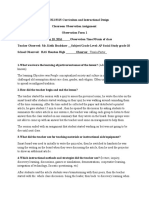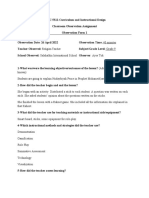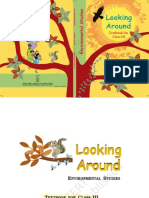0 ratings0% found this document useful (0 votes)
Document1-Xuesong Wu
Document1-Xuesong Wu
Uploaded by
api-317145143The teacher observed was Ms. Peng, teaching math to 11th grade students. She began the lesson by reviewing the concept of functions and showing examples. Students then analyzed graph expressions in groups to develop their understanding of functions in high school. The teacher used PowerPoint, the blackboard, worksheets and Geometer's Sketchpad to support the lesson. A variety of instructional methods were used, including lecture, inquiry, discussion and cooperative learning. Assessment was informal and through oral feedback. Classroom management was minimal as students stayed engaged throughout. Effective engagement strategies included briefly lecturing disengaged students.
Copyright:
© All Rights Reserved
Available Formats
Download as DOCX, PDF, TXT or read online from Scribd
Download as docx, pdf, or txt
Document1-Xuesong Wu
Document1-Xuesong Wu
Uploaded by
api-3171451430 ratings0% found this document useful (0 votes)
The teacher observed was Ms. Peng, teaching math to 11th grade students. She began the lesson by reviewing the concept of functions and showing examples. Students then analyzed graph expressions in groups to develop their understanding of functions in high school. The teacher used PowerPoint, the blackboard, worksheets and Geometer's Sketchpad to support the lesson. A variety of instructional methods were used, including lecture, inquiry, discussion and cooperative learning. Assessment was informal and through oral feedback. Classroom management was minimal as students stayed engaged throughout. Effective engagement strategies included briefly lecturing disengaged students.
Original Title
document1-xuesong wu
Copyright
© © All Rights Reserved
Available Formats
DOCX, PDF, TXT or read online from Scribd
Share this document
Did you find this document useful?
Is this content inappropriate?
The teacher observed was Ms. Peng, teaching math to 11th grade students. She began the lesson by reviewing the concept of functions and showing examples. Students then analyzed graph expressions in groups to develop their understanding of functions in high school. The teacher used PowerPoint, the blackboard, worksheets and Geometer's Sketchpad to support the lesson. A variety of instructional methods were used, including lecture, inquiry, discussion and cooperative learning. Assessment was informal and through oral feedback. Classroom management was minimal as students stayed engaged throughout. Effective engagement strategies included briefly lecturing disengaged students.
Copyright:
© All Rights Reserved
Available Formats
Download as DOCX, PDF, TXT or read online from Scribd
Download as docx, pdf, or txt
0 ratings0% found this document useful (0 votes)
Document1-Xuesong Wu
Document1-Xuesong Wu
Uploaded by
api-317145143The teacher observed was Ms. Peng, teaching math to 11th grade students. She began the lesson by reviewing the concept of functions and showing examples. Students then analyzed graph expressions in groups to develop their understanding of functions in high school. The teacher used PowerPoint, the blackboard, worksheets and Geometer's Sketchpad to support the lesson. A variety of instructional methods were used, including lecture, inquiry, discussion and cooperative learning. Assessment was informal and through oral feedback. Classroom management was minimal as students stayed engaged throughout. Effective engagement strategies included briefly lecturing disengaged students.
Copyright:
© All Rights Reserved
Available Formats
Download as DOCX, PDF, TXT or read online from Scribd
Download as docx, pdf, or txt
You are on page 1/ 2
EDUC 5312/3315-Curriculum and Instructional Design
Classroom Observation Assignment
Observation Form 1
Observation Date: March 7, 2016
Observation Time: Forty-five
Minutes Class Period
Teacher Observed: Ms. Peng Subject/Grade Level: MathGrade 11
School Observed: The Fifty-two High School of Beijing
Observer: Xuesong
Wu
1-What was/were the learning objectives/outcomes of the lesson? (Add state
objectives if known)
The learning objective was that given a plenty of examples from lives, the student
will be able to recognize that the function is a type of corresponding from a nonempty collection to another non-empty collection, and state the three elements of
function with no errors.
2-How did the teacher begin and end the lesson?
At the beginning, Mr. Peng gave some examples of function in junior schools and
reviewed the concept of function in that time about 2 minutes. Then Mr. Peng let
students analyze the graph expression of function to get the concept of function in
high schools about 10 minutes. And Mr. Peng assigned the specific things that the
students discussed in groups and came to the conclusions about the new concept
about 20 minutes. Mr. Peng gave some exercises to the students in order to enhance
the understanding of the new concept about 10 minutes. In the end, Mr. Peng let the
students summarize the contents of this class and think about if there are other
ways of definitions to function about 3 minutes.
3-What did the teacher use for teaching materials or instructional
aids/equipment?
The teacher used computer, PowerPoint, blackboard, worksheet and the Geometer's
Sketchpad.
4-Which instructional methods and strategies did the teacher use? ( lecture,
inquiry, discovery learning, discussions, games or simulations, demonstrations,
cooperative learning, integration of technology, socrative questioning, etc)
The teacher used lecture, inquiry, discussion, and cooperative learning.
5-How did the teacher assess learning? (informal, formal, formative, summative,
oral, open-ended, quiz, feedback etc) See Chapter 8 for more information on
assessment methods
The teacher used informal, oral, and feedback methods to assess learning.
6- What can you say about the teachers philosophy/beliefs and style?
(Traditional, progressive, behaviorist, student-centered vs. teacher centered,
authoritative etc)
The teacher's style mostly liked traditional and student-centered because this class
is a new concept's instructional.
7-How does the teacher manage classroom? Can you identify classroom
management techniques used?
Because most of students focused on their tasks, the teacher didn't utilize more
management techniques. Only a student was reminded to go back to the task during
the discussion.
8-Observe in the classroom setting and determine types of behavior
students play when off-task. What do they do when they are not paying
attention? How does the teacher re-direct them or get them back on task?
The normal things were sleeping and talking about non-classroom contents when
students didn't pay attention. Whereas in this class there weren't above conditions
so much because most of students focused on their assignments and observers
existed. The teacher only stood at the side of a student and continued to lecture a
few seconds to re-direct him on task.
9-How does the teacher communicate with students (verbal, vocal, meta-
verbal or non-verbal communication such as facial, body language, use of space,
motion and time?)
The teacher mostly used verbal communication and walked around the classroom
when students discussed in groups.
10-Who were the students in the class? What did you notice about them?
(Background, diversity, attitude, motivation, interaction, participation, etc)
The students were mostly the same age in the high school. The number of girls was
more than boys'. They were well engaged in their assignments without the help from
the teacher.
11-What did you see that is effective in engaging students? What do you
see that is ineffective in keeping students engaged?
The effective way that I saw was the teacher stood at the side of a student's desk
and lectured several seconds when the student didn't pay attention to his task. The
most ineffective way in keeping students engaged was the teacher lectured all the
time despite of the students' thought, but this class was fine without above this
situation.
12-What are the two instructional strategies you observed and would like
to apply in your classroom?
I would use discussion in groups and summary by students. The discussion can bring
every student's critical thinking. The summary that the students did by themselves
can improve their abilities of analysis and synthesis.
13-What are two important classroom management strategies that you
observed and would like to apply in your classroom?
The one was standing at the side of a student's desk and lecturing several seconds
when the student didn't pay attention. Another one was the rule made into the
responsibilities of students at the beginning the curriculum such as the order of
materials placed on the desk.
You might also like
- Classroom Observation Assignment-Form 1 Final Copy WeeblyNo ratings yetClassroom Observation Assignment-Form 1 Final Copy Weebly3 pages
- Classroom Observation Assignment-Form 1 Blank100% (1)Classroom Observation Assignment-Form 1 Blank3 pages
- Cem Kevser-Classroom Observation Assignment-Form 1 Blank 2No ratings yetCem Kevser-Classroom Observation Assignment-Form 1 Blank 23 pages
- 111.4. Grade 2.b.) 110.16. English Language Arts and Reading, Grade 5No ratings yet111.4. Grade 2.b.) 110.16. English Language Arts and Reading, Grade 55 pages
- Classroom Observation Assignment-Form 1 Recep BatarNo ratings yetClassroom Observation Assignment-Form 1 Recep Batar3 pages
- Classroom Observation Assignment-Form 1 Hidayet GozetenNo ratings yetClassroom Observation Assignment-Form 1 Hidayet Gozeten3 pages
- 111.4. Grade 2.b.) : Pre-Assesssment at The Beginning of The Lesson (Formal) Open-Open Ended QuestionsNo ratings yet111.4. Grade 2.b.) : Pre-Assesssment at The Beginning of The Lesson (Formal) Open-Open Ended Questions3 pages
- Touria Porter Classroom Observation Assignment-Form 1 1No ratings yetTouria Porter Classroom Observation Assignment-Form 1 13 pages
- Classroom Observation Assignment-Form 1 RgunduzNo ratings yetClassroom Observation Assignment-Form 1 Rgunduz4 pages
- Classroom Observation Assignment-Form 1 Kanuni YilmazNo ratings yetClassroom Observation Assignment-Form 1 Kanuni Yilmaz3 pages
- Instructional Project 5 - Part1 - Sema EnginNo ratings yetInstructional Project 5 - Part1 - Sema Engin3 pages
- Classroom Observation Assignment-Form 1 - Samir Ahmadov Educ5312No ratings yetClassroom Observation Assignment-Form 1 - Samir Ahmadov Educ53123 pages
- Bilek Halim Classroom Observation Assignment-Form 1No ratings yetBilek Halim Classroom Observation Assignment-Form 15 pages
- Classroom Observation Assignment-Form 1 M KaratasNo ratings yetClassroom Observation Assignment-Form 1 M Karatas3 pages
- Classroom Observation Assignment-Form 1-Sadrettin OrmanNo ratings yetClassroom Observation Assignment-Form 1-Sadrettin Orman3 pages
- Classroom Observation Assignment-Form 1 Blank 1No ratings yetClassroom Observation Assignment-Form 1 Blank 14 pages
- Classroom Observation Assignment-Form 1 Omer DoganNo ratings yetClassroom Observation Assignment-Form 1 Omer Dogan3 pages
- Instructional Project 5 - Part1 Observation Report PDFNo ratings yetInstructional Project 5 - Part1 Observation Report PDF3 pages
- Classroom Observation Assignment-Form 1-Adem ErtunaNo ratings yetClassroom Observation Assignment-Form 1-Adem Ertuna3 pages
- Classroom Observation Assignment-Form 1 Selman OnelNo ratings yetClassroom Observation Assignment-Form 1 Selman Onel3 pages
- Classroom Observation Assignment-Form 1 Blank 2No ratings yetClassroom Observation Assignment-Form 1 Blank 23 pages
- Classroom Observation Assignment - Form 1 - Sabri UnalNo ratings yetClassroom Observation Assignment - Form 1 - Sabri Unal3 pages
- Classroom Observation Assignment-Form 1 Cuma YucelNo ratings yetClassroom Observation Assignment-Form 1 Cuma Yucel4 pages
- Instructional Project 5 - Part1 Ayse TokNo ratings yetInstructional Project 5 - Part1 Ayse Tok3 pages
- THEORY ON TEACHING METHODOLOGY - Đề cươngNo ratings yetTHEORY ON TEACHING METHODOLOGY - Đề cương7 pages
- Classroom Observation Assignment-Form 1 BlankNo ratings yetClassroom Observation Assignment-Form 1 Blank4 pages
- Task1 Teaching Online Observation and Reflection TaskNo ratings yetTask1 Teaching Online Observation and Reflection Task3 pages
- What Is Your Learning Style?: A Theoretical Study On Various Learning Style Models and Assessment Techniques To Evaluate Students Learning Styles For The Multimedia Supported E-Learning EnvironmentNo ratings yetWhat Is Your Learning Style?: A Theoretical Study On Various Learning Style Models and Assessment Techniques To Evaluate Students Learning Styles For The Multimedia Supported E-Learning Environment5 pages
- 1 Classroom Observation Assignment-Form 1 Instructional Project 4No ratings yet1 Classroom Observation Assignment-Form 1 Instructional Project 43 pages
- Classroom Observation Assignment-Form1 Mustafa Citci 1No ratings yetClassroom Observation Assignment-Form1 Mustafa Citci 14 pages
- What Are The Basic Elements of Inclusive EducationNo ratings yetWhat Are The Basic Elements of Inclusive Education13 pages
- ENG519 Midterm Short Notes by MUHAMMAD (MAS All Rounder)-1No ratings yetENG519 Midterm Short Notes by MUHAMMAD (MAS All Rounder)-1158 pages
- Number Homework Assessment Worksheet Answers100% (1)Number Homework Assessment Worksheet Answers5 pages
- Butler, YG (2011) The Implementation of Communicative and Task-Based Language Teaching in The Asia-Pacific RegionNo ratings yetButler, YG (2011) The Implementation of Communicative and Task-Based Language Teaching in The Asia-Pacific Region22 pages

























































































